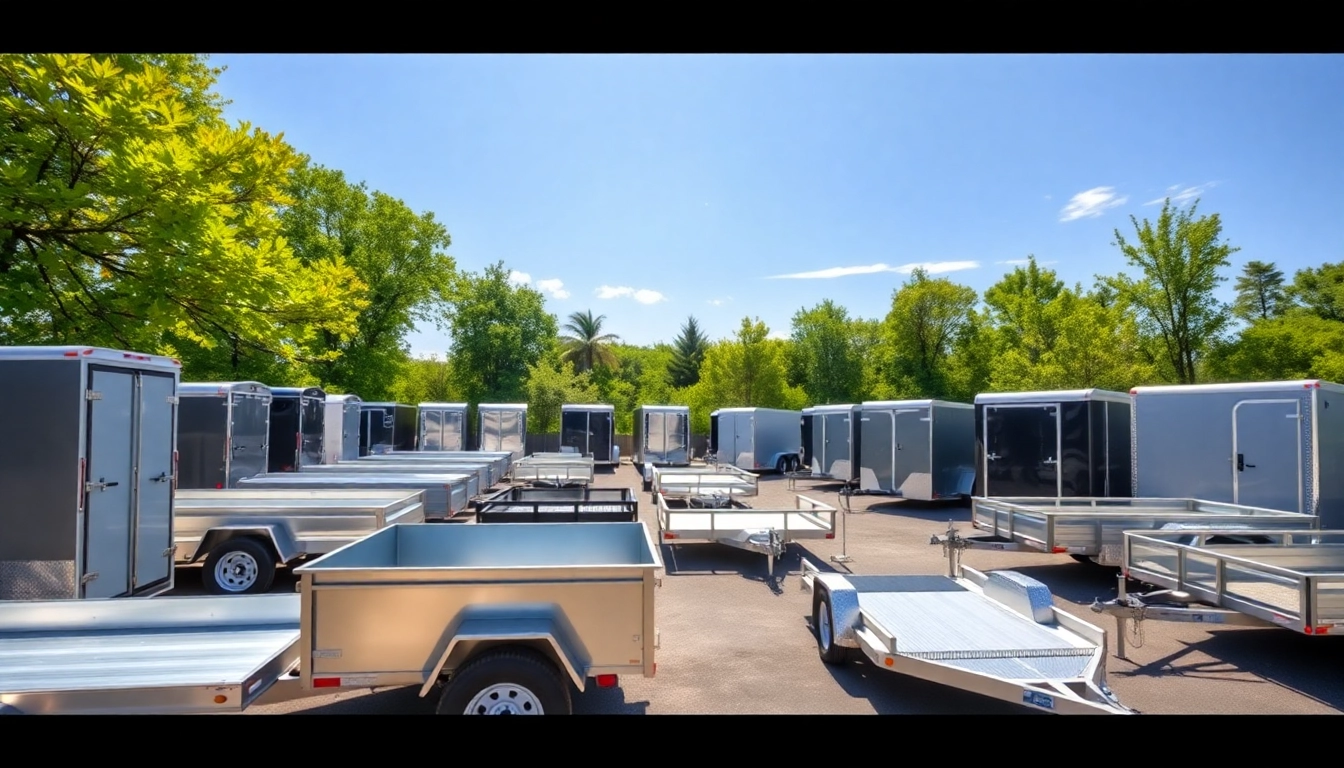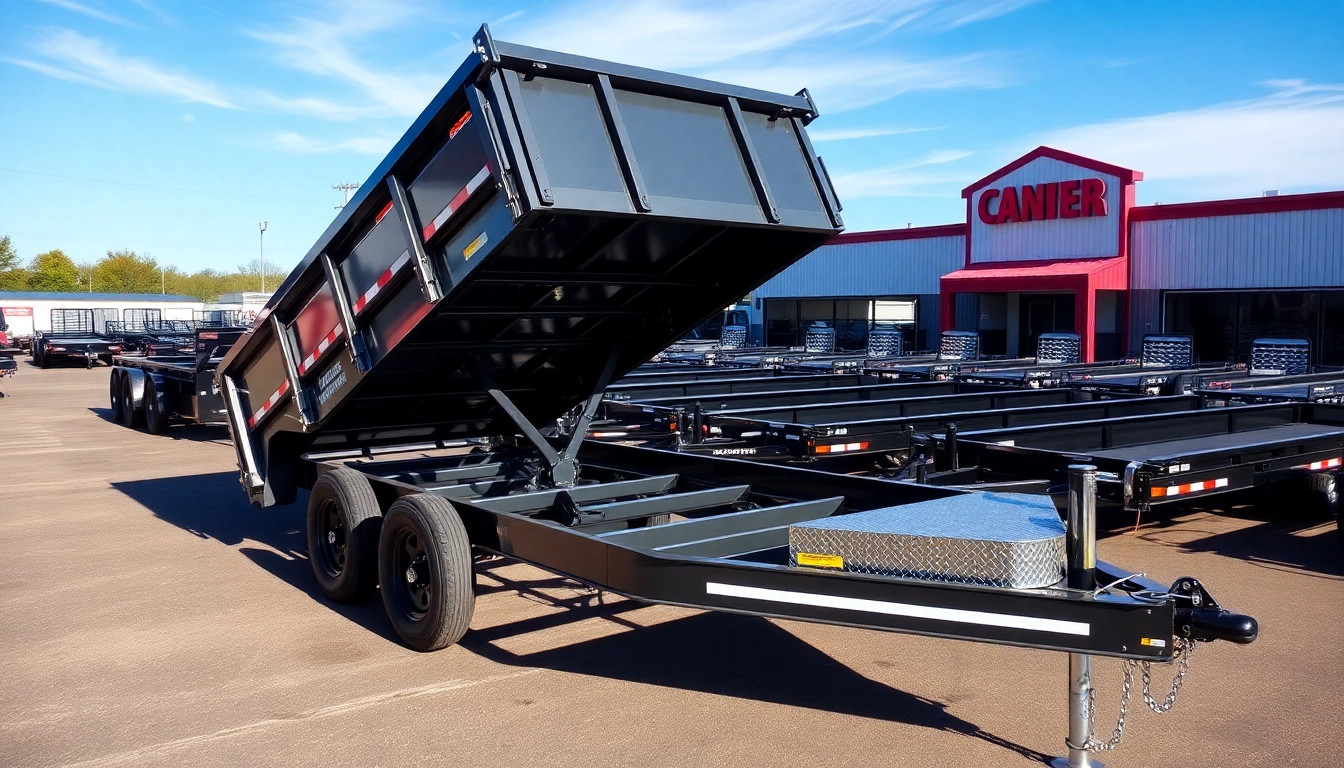Understanding Trailers for Sale in Massachusetts
When it comes to browsing trailers for sale in Massachusetts, potential buyers face an array of choices, features, and seller options. Understanding the landscape of trailer purchases is crucial for making informed decisions that meet your specific needs. This comprehensive guide covers everything from types of trailers available to key features to consider during the buying process.
What Types of Trailers Are Available?
Different types of trailers serve various purposes, and knowing which type fits your requirements can make all the difference. Here are some common categories:
- Utility Trailers: These versatile trailers are ideal for hauling materials, equipment, and recreational vehicles. They come in various sizes and designs, making them suitable for personal and commercial use.
- Enclosed Trailers: Offering protection for goods during transport, enclosed trailers are excellent for storage and provide security against the elements.
- Dump Trailers: Designed to transport bulk materials, dump trailers allow easy unloading through hydraulic mechanisms, making them popular among contractors and landscapers.
- Car Haulers: If you need to transport vehicles, these trailers are specifically designed with features that accommodate cars, trucks, or motorcycles.
- Specialty Trailers: These can include food trailers, horse trailers, and more, tailored to meet specific industry needs.
Key Features to Consider When Buying
When purchasing a trailer, it’s crucial to consider various features to ensure you select a model that meets your needs:
- Payload Capacity: Understanding the weight limit your trailer can handle is essential for both safety and functionality. Exceeding capacity can compromise performance and lead to legal issues.
- Construction Material: Trailers come in materials such as steel, aluminum, and composite. Each has its pros and cons concerning weight, durability, and price.
- Size and Dimensions: The size should match your intended use. Consider the trailer’s length, width, and height in relation to what you plan to haul.
- Braking Systems: Some trailers necessitate brakes based on their weight. Familiarizing yourself with different braking systems, such as electric or surge brakes, is essential for safe handling.
- Warranty and Maintenance: Look for trailers that come with warranties and require minimal upkeep. Understanding the maintenance requirements can save you time and money in the long run.
The Benefits of Investing in a Trailer
Investing in a trailer can yield several benefits, particularly if you frequently transport goods or equipment. Here are some key advantages:
- Versatility: Trailers can serve multiple functions, allowing for personal and commercial use over time, making them a smart investment.
- Cost Savings: Owning a trailer can reduce transportation costs, particularly if you need to move items often, eliminating rental fees.
- Convenience: Having your own trailer provides flexibility in scheduling transport without relying on rental services.
- Increased Storage: Trailers can serve as mobile storage units, providing additional space for tools, equipment, and inventory.
Where to Find Reliable Trailers for Sale in Massachusetts
Now that you understand the types of trailers and their benefits, the next step is knowing where to find reliable options in Massachusetts. This section delves into the best resources for exploring your options.
Top Locations for Buying Trailers
Buying a trailer locally can often lead to better deals and more personalized service. Here are the top places to consider:
- Local Dealerships: Visiting reputable trailer dealerships can provide a hands-on experience that online shopping cannot replicate, allowing you to assess quality and features directly.
- Trade Shows: Trailer expos and trade shows often feature the latest models and innovations, offering buyers a chance to compare various trailers in a single location.
- Classified Ads: Traditional classified ads and platforms for buying and selling can yield good deals, especially if you are open to used trailers.
Online Marketplaces vs Local Dealerships
Both online marketplaces and local dealerships have their pros and cons:
- Online Marketplaces: These can provide a broader selection and often lower prices due to competition. However, buyers must conduct due diligence regarding seller credibility.
- Local Dealerships: While the inventory may not be as broad, they can provide immediate assistance, warranties, and the option to test the trailer before purchase.
What to Look for in a Seller
Whether you choose to buy online or from a local dealership, knowing what to look for in a seller can prevent a problematic purchase:
- Reputation: Look for sellers with a strong reputation for customer service, quality products, and trustworthy practices.
- Experience: Sellers with years of experience often have established relationships with manufacturers and can provide insights into choosing the right trailer.
- Transparency: Reliable sellers should offer clear pricing, warranty details, and full specifications for their trailers.
Financing Options for Trailers in Massachusetts
Understanding financing options is crucial when investing in a trailer, especially if you’re planning to finance a new purchase. This section discusses what you need to consider regarding your budget and the various financing avenues.
Understanding Your Budget
Before diving into financing, establishing a clear budget is essential. Consider the following factors:
- Initial Costs: Calculate the total initial cost, including taxes, registration fees, and insurance.
- Ongoing Costs: Include maintenance, fuel efficiency (for towing vehicles), and any necessary modifications or upgrades to your trailer.
- Contingency Fund: It’s advisable to allocate extra funds in your budget for unforeseen repair costs that may arise.
Financing vs Cash Purchase
Deciding whether to finance or pay cash depends on your financial situation:
- Cash Purchase: Offers immediate ownership and eliminates interest payments, but may not always be viable for larger purchases.
- Financing: Allows for more flexible payment terms. Consider interest rates, monthly payments, and loan duration in your decision-making process.
Rental vs Ownership: What’s Right for You?
Individuals should assess whether renting or owning is more suitable based on their needs:
- Renting: Suitable for infrequent use or short-term projects, it eliminates maintenance responsibilities but incurs rental costs that can add up over time.
- Owning: Best for regular users, it offers flexibility and convenience while providing long-term value and potential resale opportunities.
Maintaining Your Trailer for Longevity
Once you’ve acquired your trailer, maintaining it is vital for ensuring its longevity and performance. This section covers best practices for upkeep.
Regular Maintenance Tips
Adopting a routine maintenance schedule can reduce repair costs and extend your trailer’s lifespan:
- Inspect Tires: Check tire pressure and tread regularly to ensure safe towing.
- Brake Checks: Look for wear and tear on brake pads, and ensure that braking systems are functioning correctly.
- Wash and Wax: Regular cleaning not only maintains appearance but also protects against rust and corrosion.
Common Issues and Solutions
Common trailer problems can usually be mitigated with proper care:
- Electrical Failures: Regularly check wiring and lights to prevent connectivity issues.
- Ramp Damage: Repair or replace damaged ramps promptly, as they are critical for loading and unloading.
- Structural Integrity: Inspect the frame for cracks or wear, addressing any issues to avoid more extensive repairs in the future.
Seasonal Preparations for Trailers
Preparing your trailer for seasonal and weather changes can enhance its durability:
- Winterization: For trailers stored in colder climates, consider winterizing measures such as draining fluids and covering the trailer to protect against snow and ice.
- Summer Care: In warmer months, ensure proper ventilation to prevent moisture buildup and check tire pressure frequently due to heat expansion.
Customer Insights: Experiences with Trailers for Sale in Massachusetts
Gaining insights from existing trailer owners can offer valuable information about potential purchases. This section highlights testimonials, success stories, and lessons learned from other buyers.
Testimonials from Trailer Owners
Many trailer owners have stories about how their purchases facilitated their personal or business activities. Their positive experiences offer credibility to potential buyers:
- Increased Efficiency: One owner highlights how a utility trailer improved their efficiency in transporting equipment for their business, reducing the need for rental services.
- Family Getaways: Families share how enclosed trailers enhance their camping experiences, providing ample storage space for gear and supplies during trips.
Success Stories and Use Cases
Specific use cases illustrate the versatility of trailers:
- Landscaping Business: Many contractors use dump trailers to transport materials and tools, optimizing workflow and ensuring timely job completion.
- Recreational Use: Horse trailers and toy haulers have become integral to transporting pets or recreational vehicles, allowing for enjoyable weekends and vacations.
Lessons Learned: What to Avoid When Buying
Potential buyers can benefit from the mistakes of others:
- Not Researching Sellers: Failing to vet sellers can lead to unsatisfactory purchases. Take time to research and choose reputable sellers.
- Ignoring Specifications: Some buyers overlook the importance of specifications, leading to trailers that don’t cater to their intended use.









Leave a Reply